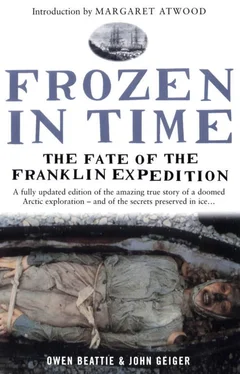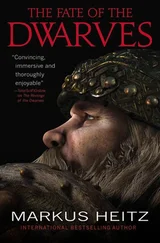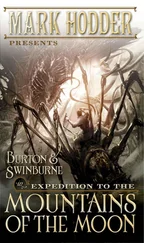That John Ross is not celebrated today as one of the epic heroes of polar exploration is remarkable. Perhaps his all-too human failings militated against such a reputation, for John Ross was the antithesis of what one might expect in a hero: corpulent, irritable and overly solicitous of class. In contrast to Parry, who did his best to provide for the comfort of his men, Ross held in contempt the entire notion of the importance of creature comforts in maintaining morale. While still aboard the Victory, for instance, Ross had reduced the heat each winter to lessen the effects of condensation. He then responded to complaints from the freezing crew by bragging loudly about his unusual capacity for generating body heat. No one ever got close enough to him to notice. There was something improbable, even absurd, about John Ross. And he paid a terrible price for his haughtiness when a disgruntled underling later helped publish an unofficial account of the expedition: a remarkable rant called The Last Voyage of Capt. John Ross —vilifying Ross’s character and mocking his physical attributes. More damaging still was the book’s inventory of his alleged shortcomings as a leader, culminating in a declaration that while “the men were conscious that they owed him obedience; they were not equally convinced that they owed him their respect and esteem.”
Such criticisms aside, the expedition’s return was a triumph of human ingenuity and survival. Its success was due to one simple measure: Ross’s emulation of the Inuit, the Earth’s hardiest survivors, who eke out a living on the margins of the habitable world and yet who do so without any trace of scurvy. The Inuit treat the contents of a caribou’s stomach and the testicles of the musk-ox as delicacies, for example, food sources that have since been proven to be powerful antiscorbutics. And whilst unwilling to consume these igloo specialities, John Ross had his men eat a diet of fresh meat and salmon, concluding that “the large use of oils and fats is the true secret of life in these frozen countries.” Where possible, therefore, he replaced supplies such as salt beef and tinned foods with fresh meat, resulting in a “very salutary change of diet to our crew.” By doing so, Ross also solved the mystery of Arctic survival. Through contact with the locals, he correctly surmised that their diet of fresh meat had antiscorbutic properties, observing that “the natives cannot subsist without it, becoming diseased and dying under a more meager diet.” As he wrote in his log, “The first salmon of the summer were a medicine which all the drugs in the ship could not replace.” The Inuit had saved John Ross’s hide and those of his crew, and he knew it, though his praise was tempered by characteristic pomposity. They were, he said, “among the most worthy of all the rude tribes yet known to our voyagers, in whatever part of the world.” It was only in his fourth winter, after he had lost contact with the Inuit and moved north to Somerset Island, where game was scarce and the expedition became dependent upon tinned foods, that scurvy had made a run at the expedition.
UNFORTUNATELY, Captain George Back, on his 1836–37 Arctic expedition, failed to learn from Ross’s example. A veteran of three expeditions across the barren lands of northern Canada, two of them under the command of John Franklin, R.N., George Back was by turns ambitious, conceited and utterly charming. An inveterate womanizer, dandy and accomplished watercolourist, Back was a knowingly Byronic figure who dabbled in poetry and possessed a certain élan, having spent five years as a prisoner of war in Revolutionary France.
Back sailed for the Arctic on 14 June 1836, with orders to travel to Repulse Bay, beyond the northwestern reaches of Hudson Bay, then to send sledge parties across the isthmus of the Melville Peninsula (an arm of the American continent) to explore its western coast. The expedition was an appalling failure. Back’s ship, the Terror, like the Victory, wasycaught in the Arctic’s thrall of relentless ice. At one point it was hurled 40 feet (12 metres) up a cliff face, only to be mauled by an iceberg. Wrote Back: “To guard against the worst I ordered the provisions and preserved meats, together with various other necessaries, to be got up from below and stowed on deck, so as to be ready at a moment to be thrown on the large floe alongside.” Men slept in their clothes, ready to abandon ship at a moment’s notice. On some nights, the ice could be heard gently caressing the hull, on others it wailed and pounded against the ship’s sides. At one point the ice reached up alongside to form a cradle, then, after holding the ship tight in the air, the floe let go its grasp and the vessel plunged into the sea. Back was astonished to glimpse in those moments a mould of the ship “stamped as perfectly as in a die in the walls of ice on either side.” Next, a huge square mass of ice of many tons collapsed, throwing up a wave 30 feet (9 metres) high that rolled over the stricken Terror. George Back:
It was indeed an awful crisis rendered more frightful from the mistiness of the night and the dimness of the moon. The poor ship cracked and trembled violently and no one could say that the next minute would not be her last, and, indeed, his own too, for with her our means of safety would probably perish.
Compounding the desperate situation, there had been a sudden, serious and—to the expedition’s captain and medical officer—inexplicable onset of illness aboard the Terror within a fortnight of the last live domestic animal being slaughtered on board. Six months into the expedition, Back complained in his journal on 26 December that the crew had been inflicted by “perverseness,” “sluggishness” and “listlessness.”
As his men began complaining of debility, Back concluded they were suffering from scurvy. Yet he made no serious attempt to secure fresh meat. Instead, he increased the provision of tinned meat, soup and vegetables, as well as lime juice and other alleged antiscorbutics. But on 13 January 1837, one of the men died. As well, ten of the ship’s crew of sixty—both officers and men—were now sick, complaining of “languor” and “shooting pains or twitches betokening weakness” in the ankles and knees. One, named Donaldson, “evinced a disposition to incoherency.” Another was suddenly “seized with syncope,” or dizziness. The provision of canned meat and “anti-scorbutics of every kind” failed to help. While Back had suffered through horrific privations before—scurvy and starvation amongst them—during previous overland expeditions, he was unnerved by the disease eating away at the Terror’s crew: “Who could help feeling that his hour also might shortly come?” He felt utterly helpless, that the situation was “beyond our comprehension or control.” At one point, he wondered if the cause might not in fact have been an illness carried aboard by one of the crew, at another he mused about the influence of the dank, hothouse atmosphere inside the ship and the freezing dry cold without.
Donaldson, the man who had shown signs of incoherency and who remained in a “drowsy stupor,” died on 5 February. On 26 April, he was followed by a Royal Marine named Alexander Young who, before dying, had requested that he be autopsied. The ship’s surgeon found Young’s liver enlarged, water in the region of the heart and the quality of his blood “poor.” When Back demanded in an official letter to the surgeon, Dr. Donovan, “his opinion of the probable consequences if the ship were detained another winter in these regions,” Donovan’s answer was that “it would be fatal to many of the officers and men.” And so, when the Terror was finally released by the ice after ten months, Back ordered the ship, badly leaking, to make for home. With a hull bound round with chain cables to seal the cracks caused by the ice and “in a sinking condition,” the Terror somehow limped across the Atlantic. Even then, in July, Back watched in impotent fury as the disease continued to spread: “The whole affair, indeed, was inexplicable to the medical officers as we had the advantage of the best provisions.” As the Terror made towards Ireland, the “apprehension of sickness had induced most of the men to go without food.” Back himself remained an invalid for six months after the dreadful voyage.
Читать дальше










